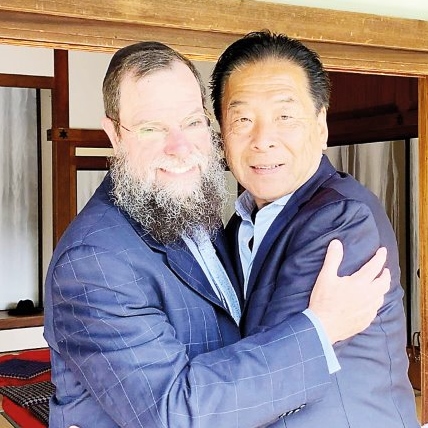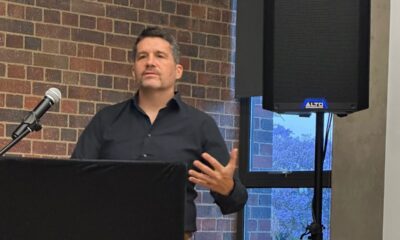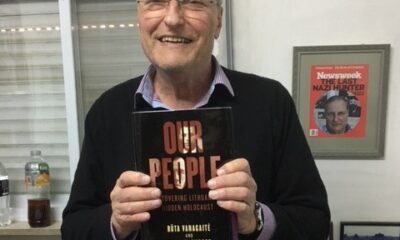
Featured Item

If you save one life, you save the world
If you ever doubted the ripple effect of one person’s good deeds on the world, a recent webinar featuring the heroic actions of a few individuals would change your mind.
Titled, “One person can save the world”, the webinar, hosted on 25 July by SA Jewish Report chairperson Howard Sackstein, looked at Holocaust Righteous of the Nations Chiune Sugihara and Oskar Schindler, whose courageous actions saved countless individuals during World War II, as well as Carl Wilkens, who helped save the Damas Gisimba orphanage in Rwanda during the genocide in 1994.
“We teach the Holocaust through the lens of choices made by individuals, communities, and governments – the choice to be upstanders, not bystanders,” said Tali Nates, the founder and director of the Johannesburg Holocaust & Genocide Centre. “Most people are bystanders, but by being a bystander, you always help the perpetrator, not the victim.”
Sugihara, known as “the Oskar Schindler of Japan” saved about 6 000 people by issuing handwritten transit visas to Japan, thereby assisting them to flee, but his actions actually translated into saving hundreds of thousands of people, said Rabbi Yossi Goldman, whose father, Simon (Shimon) Goldman, was one of those saved.
Shimon ran away from his Polish family at the age of 14 to Lithuania following the German invasion in 1939. In a book, From Shedlitz to Safety, he relates how he was saved as part of the visas issued by Sugihara to the entire Mir Yeshiva in Vilna, which he had joined. He was visa number 2 029 out of a total of 2 139 visas issued, which means he literally escaped by the skin of his teeth.
Sugihara, then the Japanese vice-consul in Kaunas, issued the visas in defiance of his government after he applied for permission, and it was rebuffed. Some of the visas were issued even as the train was pulling out of the station in Kaunas.
“He said afterwards that he might have made the wrong decision as a diplomat, but he couldn’t abandon people in need of help, and he didn’t regret it,” his granddaughter, Madoka Sugihara, told the webinar. Certainly, he paid for his decision by being thrown out of the foreign office and losing his pension. Thereafter, he worked as a porter on the docks, sacrificing his livelihood and his health.
“My grandfather showed important courage. My mission is to pass that down to the next generation,” Madoka said.
Those he saved took a perilous global journey to safety which included Vilna, Moscow, across Russia to Vladivostok, and then by ship to Kobe in Japan. After Japan joined the war on the side of the Germans in 1941, the yeshiva boys went to Shanghai, where they stayed for a year, realising that most of them were now all alone in the world. Thereafter, helped by the Lubavitch headquarters in New York, they travelled to the city via San Francisco and Chicago.
Deren Chaskiel, the grandfather of Rabbi Asher Deren in Cape Town, was also on that list – visa number 2 031. Asher later married Rabbi Goldman’s daughter, Zeesy, in a strange and wonderful closing of the circle.
Doron Goldstein, who lives in Manhattan, is related to another couple on “Sugihara’s list”. Although his parents had already made aliyah to Israel at the outbreak of war, his aunt and uncle, still in Vilna in 1940, were desperate.
Goldstein discovered their nine-year journey to safety only two years ago, a journey made via Calcutta in India, where they spent three years before getting permission from the British government to go to Palestine. Eventually the family was reunited in the United States.
Describing their desperation, Goldstein said, “Imagine the feeling they had in getting that visa. There wasn’t any time, they left in a hurry. The visa story is about escape.”
Watching the webinar, the Japanese ambassador to South Africa, E. Norio Maruyama, said, “The strong belief and will of one man saved thousands of precious lives. As a Japanese, I’m so proud of him and his courage.”
Nates has an intimate connection with heroism. Both her father and uncle were saved by Schindler, a complex and famous individual who ultimately saved about 1 200 men, women, and children by employing them in his factories in Krakow and Brunnlitz.
Nates father, Moses Turner, was just 14 when war broke out. He was sent to a number of concentration camps, but he and his brother, Henryk Turner, survived after they were eventually listed as “barrack builders” by Schindler for his factory at Brunnlitz, where they were liberated by the Soviets.
Schindler, a German and a member of the Nazi party, is described as a crazy adventurer, courageous and charming in turn. He profited from Jews, and helped them. But it was ultimately personal relationships with his Jewish advisers that helped him to understand the tragedy he was witnessing, and make the decision to defy authority to save lives.
“About 27 000 individuals are recognised by Yad Vashem as Righteous of the Nations,” Nates said. “They come from many countries and did it for many different reasons – religious, values, adventure. Many times, it was just through human connection, which helped them to see a human being in need. That’s why education is so important.”
This theme appears once again in the story of Carl Wilkens, an American aid worker who helped to save the lives of 400 adults and children shored up in the Gisimba orphanage in Kigali, Rwanda,during the 1994 genocide against the Tutsi in Rwanda.
Wilkens defied his government by staying in the country after all Americans were evacuated. Once again, he did so because he had formed close relationships with the people who worked for him, and he feared for their lives. More than 20 000 Tutsis were being butchered every day by Hutu extremists following a toxic propaganda campaign during the 100 days of the genocide.
Wilkens saved the orphanage from a massacre after it was surrounded by machine-gun wielding militia. He went to the colonel in charge of the city to appeal for their lives, and was tipped off by the colonel’s secretary that no less than the Rwandan Prime Minister Jean Kambanda was in the building. He managed to alert the Prime Minister that a massacre was about to occur, and for various complex reasons, was assured of their safety.
“Survival happens one moment at a time,” he said. “It takes courage and an ability to respond, but it also takes the ability to find allies among your enemies, and a network.
“One person might make the initial choice to do something, but that becomes an inspiration for others. These networks are crucial.”










